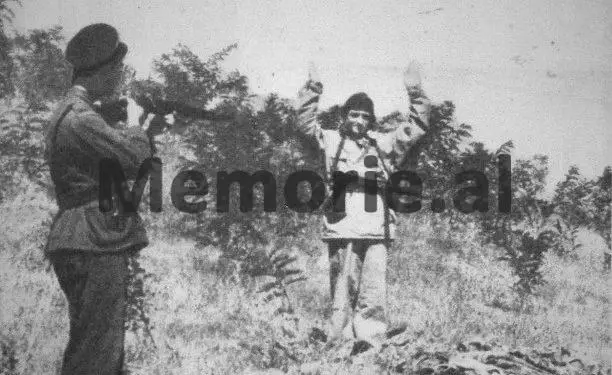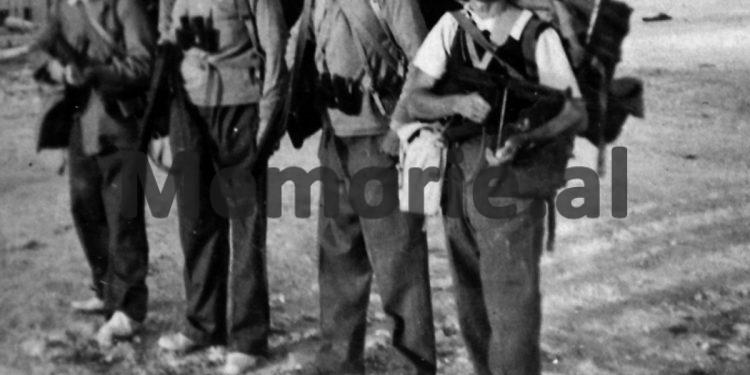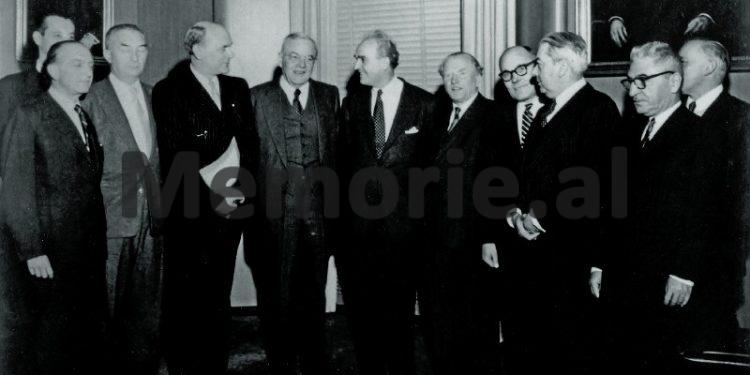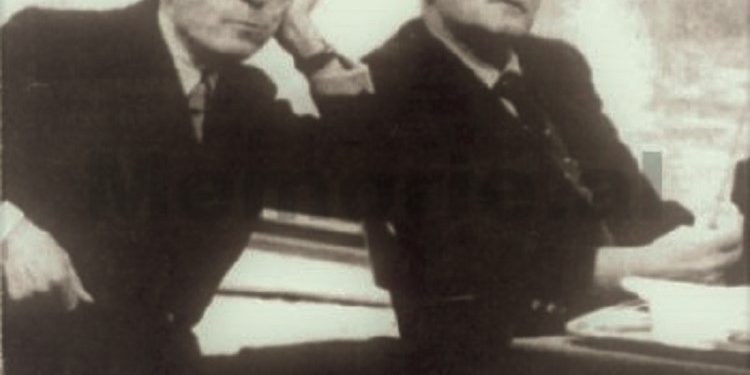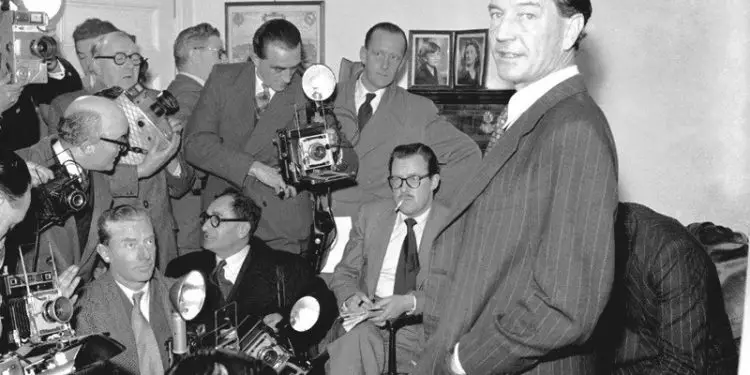By Albert Kotini
The first part
-The failure of the “Valuable” operation to overthrow Enver Hoxha-
Memorie.al / In the occupied Balkan countries, agencies were divided during World War II, for countries that were considered allies of the Germans and countries that were its enemies. The Germans considered Albania and Kosovo as their allies and this is also appreciated by the discoveries of the opposing countries. Sandor Rado, Hungarian, during World War II, was in charge of a “red orchestra” espionage network that operated in Switzerland, in favor of the Soviet Union. After World War II, he wrote the book “The name of the fight – Dora”. The essence of this book about Albania is about his activity in the city of Vlora.
Mario Del Pero, in his book “CIA – the history of the American secret services”, related to the clandestine operations in Albania, implemented immediately after World War II, was called the “Valuable” operation, planned at the end of of 1948 and implemented, between 1949-1951, constituted a clandestine operation of the paramilitary type. Infiltrations of small armed groups into Albanian territory were predicted.
Coordinated and directed from outside the country, they had to carry out military actions to destabilize the country and overthrow the communist leader, Enver Hoxha. The first director of the OPC (Office of Policy Coordination), Frank Wisner, called it a “clinical experiment” (clinical experiment), with which he could verify the capacity of the West to reduce the area of influence of the USSR.
The choice of Albania, as the theater of this experiment, was mainly dictated by the geographical reason: Great Britain had its bases in the Mediterranean Sea, and Albania territorially, was not adjacent to the rest of the ‘Communist Bloc’, being limited to only two states opposing Moscow (Greece and Yugoslavia).
Operation “Valuable” was resolved with a resounding defeat from many directions, where it was suspected that within the Western secret services, there was a Soviet informant. This spy was Kim Philby, recently appointed liaison officer between MI-6 and the CIA in Washington and one of the two British members of the US-Great Britain commission responsible for the clandestine operation in Albania. In the end, the Albanian operation was canceled! Kim Filbi, from that position, gave Moscow important information, clandestine operations, in particular, about the “Valuable” operation in Albania.
Kim Philby
In his book “My Secret War,” Kim Philby, among other things, writes: “Very soon after my arrival in Washington, the American and British governments sanctioned in principle the conduct of covert operations aimed at breaking up a from the countries of Eastern Europe, from the ‘Socialist Bloc’. According to the reason, the turn fell on Albania. This was the smallest and weakest, from the socialist countries.
In the South, it borders Greece, with which, England and the USA, maintained allied relations and which, formally, and was still in a state of war with Albania. Albania seemed isolated to our interests, and besides, it was easily accessible from Malta, by air and sea. Considering the possibility of numerous complications of a political nature, related to this project, the State Department and the Ministry of Foreign Affairs insisted on the strict control of this operation, from their side. The implementation of the plan was entrusted to the SIS and the Directorate of Political Coordination.
Both the Americans and the British had connections with Albanian groups and immigrants, therefore both parties began to mobilize their people for the implementation of the counter-revolutionary overthrow. The British gave Malta as an advanced base for operations, as well as small ships, necessary for the landing of agents.
The Americans secured the operation, mostly with money and material, and designated the airfield of Willus-field, in Libya, as a rear base and supply point. King Idriz was not told the secret, and at this time he was only Emir. After endless Anglo-American discussions, Malta was our main refuge.
“We must think of some subversive operation somewhere,” Wisner once told me, “when we discover here that the English have an island nearby.” The discussions concerned the issue of counter-revolutionary political leadership. At this time, the Dulles era had not yet begun and the US was afraid to act openly in support of very reactionary regimes. Therefore, the State Department intended to surround the counter-revolution with “democratic” attributes.
For this purpose, the Department of State, preceding us, forced a handful of Albanian refugees in New York to create the so-called ‘National Committee’, and to elect a certain Hasan Dosti as its head. Dosti was a young lawyer who, according to the Directorate of Political Coordination, had an unblemished reputation as a democrat, although I could not find any evidence of the justice of this view. Despite my repeated requests, I could not get a meeting with Dosti.
The Directorate of Political Coordination, as I was told, had to deal with him very delicately, because he was very cowardly. Good candidate for the role of leader!
If the National Committee in New York raised doubts, then the English candidate for leadership really worried me. This was the head of a small clan, named Abaz Kupi, an old friend of Julian Emer. Judging by the photo; this man sported a mustache and was armed to the teeth, a typical product of British guardianship.
I did not doubt that he was capable, like his forefathers, of making raids on unarmed caravans, or stealthily shooting the heat-crazed, tired, and gibbering Turkish soldier on some mountain pass, but, I never share the enthusiasm of the British gentleman, with the appearance of the representative of the savage tribe.
By the way, if Dosti was a weak man, then Abaz Kupi was an old fox. Endless discussions between the English and the Americans, about the merits of both rivals, if, leaving out the other sides of the issue, and looking at it only as a contest, the problem was, who should be chosen, (?) – The English or the Americans, because they would determine the policy of the government (in Albania), if it were to be formed.
When finally, both one side and the other, got tired of the discussions and started looking for a compromise solution, it turned out that Dosti and Abaz Kupi, under the influence of their supporters, took such tough positions that none of them, it would not fill his mind to serve under the leadership of another. Day-to-day control of the operation was in the hands of the Special Policy Committee, which met in Washington.
It consisted of 4 members, who represented the Department of State, the Ministry of Foreign Affairs, the Directorate of Political Coordination and the SIS. The State Department appointed to the committee Bob Joyce, the sociable guy who had experience in the problems of the Balkans, Earl Xeliko, from the English embassy, also a charming guy, who represented the Ministry of Foreign Affairs; the third guy was Frank Lindsey, from the Directorate of Political Coordination, and finally the fourth member of the committee was me.
It is not difficult to guess that thanks to this composition, our meetings were far from informal. Lindsey set the tone by declaring at our first meeting that the only Albanian he had seen was hanging in parallel, with his head down. (?)…!
Even in the most serious moments, we Anglo-Saxons did not forget that our agents, only a short time ago, were falling from the trees. Although I said that the Special Policy Committee exercised control over the operation, we could never act as free people.
My bosses in London did not allow me to forget the commitment of the SIS, regarding Abaz Kupi, while behind the backs of my bosses, always, Bevin’s formula seemed far away: “I can’t stand this”, which he used when he wanted to stop something. Frank Lindsey, too, was undoubtedly bound by such restrictions.
Perhaps strange, but nevertheless, the operation began even under these conditions. Finally, the SIS managed to land a small group of agents on the Albanian coast, with the task of penetrating deep into the country, collecting the necessary data and, moving south, to Greece. The English believed that the data collected on the way by the agents helped to carry out wider plans.
The operation, understandably, was hopeless from the start. SIS agents could only achieve something by infiltrating the cities. But the cities were under the strong control of the Albanian authorities. Therefore, in order to stay alive, the agents, you had to hide in the mountains, where they could derive some benefit, in case the country was engulfed in insurrection. Perhaps at the base of our adventure, there was precisely the unspoken hope for an uprising…!
In the end, however, some agents were able to cross into Greece, where they, with great difficulty, managed to escape the clutches of the Greek Security Service, who could shoot them as if nothing was wrong. The information they brought was almost always negative. At least it was clear that they, in no place, welcomed them with open arms. With the passage of time, without making a noise, the operation was forgotten, without any significant impact on the state of Albanians.
Perhaps it turned out for good, for the English and American governments, that their effort suffered defeat. In case of success, they would have endless troubles, with the young people they were protecting, not to mention the serious difficulties, with Greece and Yugoslavia, and maybe even with Italy…”!
In the interview he gave to the journalist Filip Knightli, in January 1988, we read: “Knightli – and you, do you not feel any remorse for the death of the people you helped? For example, the Albanian operation? (Filbi , coordinated the joint operations of the CIA and the SIS for the introduction in the late 40s and early 50s of agents in Albania, with the aim of inciting an uprising there. For this operation, Filbi, informed the KGB and the agents, after landing on the ground, were captured and shot). Memorie.al




